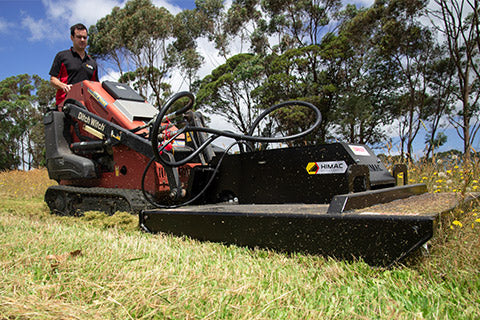
When taking on new construction projects or expanding into new territories, a main consideration is which pieces of equipment will bring the greatest return on your investment, and which earthmoving machines are right for your types of work.
Consider the major benefits in buying smaller earthmoving equipment. They are much easier to move from site to site and they feature simple operations for ease of use. Here we will compare three mini but mighty earthmoving machines that are similar in the types of jobs they handle. But, it's small differences that can make all the difference when you need to secure good equipment with multiple attachments to handle a wider range of tasks.
When a Mini Loader is the right choice
These mini-earthmovers are so versatile that you're just as likely to see them at work on a golf course or commercial landscaping job as on a construction site. Mini Loaders are available with either tracked or wheeled models, are fast-moving, and will articulate quicker than a skid steer. You can expect a travel speed of up to 22 km/h for a mini loader versus 25 km/h for a small skid steer.
You will find a variety of Mini Loader attachments aside from the standard bucket. Mount a brush grapple head and the mini loader rips out brush and clears fallen tree limbs. With a demolition grapple, fast work is made of small structures and site preparation. Attach a pallet fork for moving equipment from staging areas directly to construction workers. Secure an auger drive or chain trencher attachment and you plough through the hardest of soils for serious earthmoving projects.
Popular brands of mini loaders include Kubota, ASV, Caterpillar, and Polaris, with prices starting around $40,000 for the smallest compact track loaders and increasing to the $75,000 range.
Small Skid Steers can handle big jobs
For manoeuverability and getting into tight spaces or areas with low overhead clearances, a skid steer is the right equipment for the job. These mighty movers can lift loads to greater heights and feature automatic attachment changer mechanisms. These four-wheel vehicles are commonly used for earthmoving tasks when access space is limited. This small, hydraulic compact utility vehicle is synonymous with the name Bobcat, a leading manufacturer of skid steers.
When it comes to earthworks, compact skid steers are used for debris removal, trenching, leveling, landscape installations and heavy lifting. These wide varieties of tasks are accomplished with an even wider array of small skid steer attachments, including high capacity buckets, stick rakes, augers and trenchers, bucket brooms, cement mixer buckets and much more.
Expect price ranges for a small frame model with a capacity of up to 1,750 pounds to start around $20,000, but expect to pay more for a John Deere or a Bobcat. Other manufacturers include Gehl, Case, Komatsu and New Holland to name a few.
Small Excavators are an earthmoving workhorse
You will find several makers of small excavators to fit tight spaces but still have the power to demolish, dig, drag, and haul heavy loads within the most demanding terrains. Whether you're digging swimming pools, repairing sewer lines, digging holes, or demolishing a small structure, a compact, tracked excavator delivers the power to move and lift more weight.
Your small excavator attachments will increase the versatility of these machines, including bucket shovels, scoop rakes, ground rippers, rock breakers, and heavy-duty slashers to cut through dense vegetation. Depending on the manufacturer and the engine power, expect to pay from $20,000 to $60,000 for a new model, and much less for a used version. Airman, Bobcat, Case, Caterpillar, and Kubota are well-known name brands.
When you need the right attachment, for the right job, to fit the right equipment, Himac Attachments supplies a wider range of earthmoving equipment attachments so you only need one stop for all your earthmoving projects.


